Distributed RPC Framework
DISTRIBUTED RPC FRAMEWORK
The distributed RPC framework provides mechanisms for multi-machine model training through a set of primitives to allow
for remote communication, and a higher-level API to automatically differentiate models split across several machines.
Distributed RPC Framework
Design Notes
The distributed autograd design note covers the design of the RPC-based distributed autograd framework that is useful for
applications such as model parallel training.
Distributed Autograd Design
The RRef design note covers the design of the RRef (Remote REFerence) protocol used to refer to values on remote
workers by the framework.
Remote Reference Protocol
Tutorials
The RPC tutorial introduces users to the RPC framework and provides two example applications using torch.distributed.rpc
APIs.
Getting started with Distributed RPC Framework
�
Named Tensors operator coverage
NAMED TENSORS OPERATOR COVERAGE
Please read Named Tensors first for an introduction to named tensors.
This document is a reference for name inference, a process that defines how named tensors:
1. use names to provide additional automatic runtime correctness checks
2. propagate names from input tensors to output tensors
Below is a list of all operations that are supported with named tensors and their associated name inference rules.
If you don’t see an operation listed here, but it would help your use case, please search if an issue has already been filed
and if not, file one.
WARNING
The named tensor API is experimental and subject to change.
API
Tensor.abs(), torch.abs()
Tensor.abs_()
Tensor.acos(), torch.acos()
Tensor.acos_()
Tensor.add(), torch.add()
Tensor.add_()
Tensor.addmm(), torch.addmm()
Tensor.addmm_()
Tensor.addmv(), torch.addmv()
Tensor.addmv_()
Tensor.align_as()
Tensor.align_to()
Tensor.all(), torch.all()
Tensor.any(), torch.any()
Tensor.asin(), torch.asin()
Tensor.asin_()
Tensor.atan(), torch.atan()
Tensor.atan2(), torch.atan2()
Tensor.atan2_()
Tensor.atan_()
Tensor.bernoulli(), torch.bernoulli()
Tensor.bernoulli_()
Tensor.bfloat16()
Tensor.bitwise_not(), torch.bitwise_not()
Tensor.bitwise_not_()
Tensor.bmm(), torch.bmm()
Tensor.bool()
Tensor.byte()
torch.cat()
Name inference rule
Keeps input names
Keeps input names
Keeps input names
Keeps input names
Unifies names from inputs
Unifies names from inputs
Contracts away dims
Contracts away dims
Contracts away dims
Contracts away dims
See documentation
See documentation
None
None
Keeps input names
Keeps input names
Keeps input names
Unifies names from inputs
Unifies names from inputs
Keeps input names
Keeps input names
None
Keeps input names
Keeps input names
None
Contracts away dims
Keeps input names
Keeps input names
Unifies names from inputs
�
API
Tensor.cauchy_()
Tensor.ceil(), torch.ceil()
Tensor.ceil_()
Tensor.char()
Tensor.chunk(), torch.chunk()
Tensor.clamp(), torch.clamp()
Tensor.clamp_()
Tensor.copy_()
Tensor.cos(), torch.cos()
Tensor.cos_()
Tensor.cosh(), torch.cosh()
Tensor.cosh_()
Tensor.cpu()
Tensor.cuda()
Tensor.cumprod(), torch.cumprod()
Tensor.cumsum(), torch.cumsum()
Tensor.data_ptr()
Tensor.detach(), torch.detach()
Tensor.detach_()
Tensor.device, torch.device()
Tensor.digamma(), torch.digamma()
Tensor.digamma_()
Tensor.dim()
Tensor.div(), torch.div()
Tensor.div_()
Tensor.dot(), torch.dot()
Tensor.double()
Tensor.element_size()
torch.empty()
torch.empty_like()
Tensor.eq(), torch.eq()
Tensor.erf(), torch.erf()
Tensor.erf_()
Tensor.erfc(), torch.erfc()
Tensor.erfc_()
Tensor.erfinv(), torch.erfinv()
Tensor.erfinv_()
Tensor.exp(), torch.exp()
Tensor.exp_()
Tensor.expand()
Tensor.expm1(), torch.expm1()
Tensor.expm1_()
Tensor.exponential_()
Tensor.fill_()
Name inference rule
None
Keeps input names
None
Keeps input names
Keeps input names
Keeps input names
None
out function and in-place variants
Keeps input names
None
Keeps input names
None
Keeps input names
Keeps input names
Keeps input names
Keeps input names
None
Keeps input names
None
None
Keeps input names
None
None
Unifies names from inputs
Unifies names from inputs
None
Keeps input names
None
Factory functions
Factory functions
Unifies names from inputs
Keeps input names
None
Keeps input names
None
Keeps input names
None
Keeps input names
None
Keeps input names
Keeps input names
None
None
None
�
API
Tensor.flatten(), torch.flatten()
Tensor.float()
Tensor.floor(), torch.floor()
Tensor.floor_()
Tensor.frac(), torch.frac()
Tensor.frac_()
Tensor.ge(), torch.ge()
Tensor.get_device(), torch.get_device()
Tensor.grad
Tensor.gt(), torch.gt()
Tensor.half()
Tensor.has_names()
Tensor.index_fill(), torch.index_fill()
Tensor.index_fill_()
Tensor.int()
Tensor.is_contiguous()
Tensor.is_cuda
Tensor.is_floating_point(), torch.is_floating_poin
t()
Tensor.is_leaf
Tensor.is_pinned()
Tensor.is_shared()
Tensor.is_signed(), torch.is_signed()
Tensor.is_sparse
torch.is_tensor()
Tensor.item()
Tensor.kthvalue(), torch.kthvalue()
Tensor.le(), torch.le()
Tensor.log(), torch.log()
Tensor.log10(), torch.log10()
Tensor.log10_()
Tensor.log1p(), torch.log1p()
Tensor.log1p_()
Tensor.log2(), torch.log2()
Tensor.log2_()
Tensor.log_()
Tensor.log_normal_()
Tensor.logical_not(), torch.logical_not()
Tensor.logical_not_()
Tensor.logsumexp(), torch.logsumexp()
Tensor.long()
Tensor.lt(), torch.lt()
torch.manual_seed()
Tensor.masked_fill(), torch.masked_fill()
Name inference rule
See documentation
Keeps input names
Keeps input names
None
Keeps input names
None
Unifies names from inputs
None
None
Unifies names from inputs
Keeps input names
See documentation
Keeps input names
None
Keeps input names
None
None
None
None
None
None
None
None
None
None
Removes dimensions
Unifies names from inputs
Keeps input names
Keeps input names
None
Keeps input names
None
Keeps input names
None
None
None
Keeps input names
None
Removes dimensions
Keeps input names
Unifies names from inputs
None
Keeps input names
�
API
Tensor.masked_fill_()
Tensor.masked_select(), torch.masked_select()
Tensor.matmul(), torch.matmul()
Tensor.mean(), torch.mean()
Tensor.median(), torch.median()
Tensor.mm(), torch.mm()
Tensor.mode(), torch.mode()
Tensor.mul(), torch.mul()
Tensor.mul_()
Tensor.mv(), torch.mv()
Tensor.names
Tensor.narrow(), torch.narrow()
Tensor.ndim
Tensor.ndimension()
Tensor.ne(), torch.ne()
Tensor.neg(), torch.neg()
Tensor.neg_()
torch.normal()
Tensor.normal_()
Tensor.numel(), torch.numel()
torch.ones()
Tensor.pow(), torch.pow()
Tensor.pow_()
Tensor.prod(), torch.prod()
torch.rand()
torch.rand()
torch.randn()
torch.randn()
Tensor.random_()
Tensor.reciprocal(), torch.reciprocal()
Tensor.reciprocal_()
Tensor.refine_names()
Tensor.register_hook()
Tensor.rename()
Tensor.rename_()
Tensor.requires_grad
Tensor.requires_grad_()
Tensor.resize_()
Tensor.resize_as_()
Tensor.round(), torch.round()
Tensor.round_()
Tensor.rsqrt(), torch.rsqrt()
Tensor.rsqrt_()
Name inference rule
None
Aligns mask up to input and then unifies_names_from_input_tens
ors
Contracts away dims
Removes dimensions
Removes dimensions
Contracts away dims
Removes dimensions
Unifies names from inputs
Unifies names from inputs
Contracts away dims
See documentation
Keeps input names
None
None
Unifies names from inputs
Keeps input names
None
Keeps input names
None
None
Factory functions
Unifies names from inputs
None
Removes dimensions
Factory functions
Factory functions
Factory functions
Factory functions
None
Keeps input names
None
See documentation
None
See documentation
See documentation
None
None
Only allow resizes that do not change shape
Only allow resizes that do not change shape
Keeps input names
None
Keeps input names
None
�
API
Tensor.select(), torch.select()
Tensor.short()
Tensor.sigmoid(), torch.sigmoid()
Tensor.sigmoid_()
Tensor.sign(), torch.sign()
Tensor.sign_()
Tensor.sin(), torch.sin()
Tensor.sin_()
Tensor.sinh(), torch.sinh()
Tensor.sinh_()
Tensor.size()
Tensor.split(), torch.split()
Tensor.sqrt(), torch.sqrt()
Tensor.sqrt_()
Tensor.squeeze(), torch.squeeze()
Tensor.std(), torch.std()
torch.std_mean()
Tensor.stride()
Tensor.sub(), torch.sub()
Tensor.sub_()
Tensor.sum(), torch.sum()
Tensor.tan(), torch.tan()
Tensor.tan_()
Tensor.tanh(), torch.tanh()
Tensor.tanh_()
torch.tensor()
Tensor.to()
Tensor.topk(), torch.topk()
Tensor.transpose(), torch.transpose()
Tensor.trunc(), torch.trunc()
Tensor.trunc_()
Tensor.type()
Tensor.type_as()
Tensor.unbind(), torch.unbind()
Tensor.unflatten()
Tensor.uniform_()
Tensor.var(), torch.var()
torch.var_mean()
Tensor.zero_()
torch.zeros()
Name inference rule
Removes dimensions
Keeps input names
Keeps input names
None
Keeps input names
None
Keeps input names
None
Keeps input names
None
None
Keeps input names
Keeps input names
None
Removes dimensions
Removes dimensions
Removes dimensions
None
Unifies names from inputs
Unifies names from inputs
Removes dimensions
Keeps input names
None
Keeps input names
None
Factory functions
Keeps input names
Removes dimensions
Permutes dimensions
Keeps input names
None
None
Keeps input names
Removes dimensions
See documentation
None
Removes dimensions
Removes dimensions
None
Factory functions
Supported Operations
Keeps input names
All pointwise unary functions follow this rule as well as some other unary functions.
�
Check names: None
Propagate names: input tensor’s names are propagated to the output.
>>> x = torch.randn(3, 3, names=('N', 'C'))
>>> x.abs().names
('N', 'C')
Removes dimensions
All reduction ops like sum() remove dimensions by reducing over the desired dimensions. Other operations like select()
and squeeze() remove dimensions.
Wherever one can pass an integer dimension index to an operator, one can also pass a dimension name. Functions that
take lists of dimension indices can also take in a list of dimension names.
Check names: If dim or dims is passed in as a list of names, check that those names exist in self.
Propagate names: If the dimensions of the input tensor specified by dim or dims are not present in the output tensor,
then the corresponding names of those dimensions do not appear in output.names.
>>> x = torch.randn(1, 3, 3, 3, names=('N', 'C', 'H', 'W'))
>>> x.squeeze('N').names
('C', 'H', 'W')>>> x = torch.randn(3, 3, 3, 3, names=('N', 'C', 'H', 'W'))
>>> x.sum(['N', 'C']).names
('H', 'W')# Reduction ops with keepdim=True don't actually remove dimensions.>>> x = torch.randn(3, 3, 3,
3, names=('N', 'C', 'H', 'W'))
>>> x.sum(['N', 'C'], keepdim=True).names
('N', 'C', 'H', 'W')
Unifies names from inputs
All binary arithmetic ops follow this rule. Operations that broadcast still broadcast positionally from the right to preserve
compatibility with unnamed tensors. To perform explicit broadcasting by names, use Tensor.align_as().
Check names: All names must match positionally from the right. i.e., in tensor + other, match(tensor.names[i],
other.names[i]) must be true for all i in (-min(tensor.dim(), other.dim()) + 1, -1].
Check names: Furthermore, all named dimensions must be aligned from the right. During matching, if we match a
named dimension A with an unnamed dimension None, then A must not appear in the tensor with the unnamed
dimension.
Propagate names: unify pairs of names from the right from both tensors to produce output names.
For example,
# tensor: Tensor[ N, None]# other: Tensor[None, C]>>> tensor = torch.randn(3, 3, names=('N', None))
>>> other = torch.randn(3, 3, names=(None, 'C'))
>>> (tensor + other).names
('N', 'C')
Check names:
match(tensor.names[-1], other.names[-1]) is True
match(tensor.names[-2], tensor.names[-2]) is True
Because we matched None in tensor with 'C', check to make sure 'C' doesn’t exist in tensor (it does not).
Check to make sure 'N' doesn’t exists in other (it does not).
Finally, the output names are computed with [unify('N', None), unify(None, 'C')] = ['N', 'C']
More examples:
# Dimensions don't match from the right:# tensor: Tensor[N, C]# other: Tensor[ N]>>> tensor = torch.ra
ndn(3, 3, names=('N', 'C'))
>>> other = torch.randn(3, names=('N',))
>>> (tensor + other).names
RuntimeError: Error when attempting to broadcast dims ['N', 'C'] and dims
['N']: dim 'C'and dim 'N' are at the same position fromthe right but do
not match.# Dimensions aren't aligned when matching tensor.names[-1] and other.names[-1]:# tensor: Tensor
[N, None]# other: Tensor[ N]>>> tensor = torch.randn(3, 3, names=('N', None))
>>> other = torch.randn(3, names=('N',))
>>> (tensor + other).names
�
RuntimeError: Misaligned dims when attempting to broadcast dims ['N'] and
dims ['N', None]: dim 'N' appears in a different position fromthe right
across both lists.
NOTE
In both of the last examples, it is possible to align the tensors by names and then perform the addition. Use
Tensor.align_as() to align tensors by name or Tensor.align_to() to align tensors to a custom dimension ordering.
Permutes dimensions
Some operations, like Tensor.t(), permute the order of dimensions. Dimension names are attached to individual
dimensions so they get permuted as well.
If the operator takes in positional index dim, it is also able to take a dimension name as dim.
Check names: If dim is passed as a name, check that it exists in the tensor.
Propagate names: Permute dimension names in the same way as the dimensions that are being permuted.
>>> x = torch.randn(3, 3, names=('N', 'C'))
>>> x.transpose('N', 'C').names
('C', 'N')
Contracts away dims
Matrix multiply functions follow some variant of this. Let’s go through torch.mm() first and then generalize the rule for batch
matrix multiplication.
For torch.mm(tensor, other):
Check names: None
Propagate names: result names are (tensor.names[-2], other.names[-1]).
>>> x = torch.randn(3, 3, names=('N', 'D'))
>>> y = torch.randn(3, 3, names=('in', 'out'))
>>> x.mm(y).names
('N', 'out')
Inherently, a matrix multiplication performs a dot product over two dimensions, collapsing them. When two tensors are
matrix-multiplied, the contracted dimensions disappear and do not show up in the output tensor.
torch.mv(), torch.dot() work in a similar way: name inference does not check input names and removes the dimensions
that are involved in the dot product:
>>> x = torch.randn(3, 3, names=('N', 'D'))
>>> y = torch.randn(3, names=('something',))
>>> x.mv(y).names
('N',)
Now, let’s take a look at torch.matmul(tensor, other). Assume that tensor.dim() >= 2 and other.dim() >= 2.
Check names: Check that the batch dimensions of the inputs are aligned and broadcastable. See Unifies names
from inputs for what it means for the inputs to be aligned.
Propagate names: result names are obtained by unifying the batch dimensions and removing the contracted
dimensions: unify(tensor.names[:-2], other.names[:-2]) + (tensor.names[-2], other.names[-1]).
Examples:
# Batch matrix multiply of matrices Tensor['C', 'D'] and Tensor['E', 'F'].# 'A', 'B' are batch dimensions
.>>> x = torch.randn(3, 3, 3, 3, names=('A', 'B', 'C', 'D'))
>>> y = torch.randn(3, 3, 3, names=('B', 'E', 'F'))
>>> torch.matmul(x, y).names
('A', 'B', 'C', 'F')
Finally, there are fused add versions of many matmul functions. i.e., addmm() and addmv(). These are treated as composing
name inference for i.e. mm() and name inference for add().
Factory functions
Factory functions now take a new names argument that associates a name with each dimension.
�

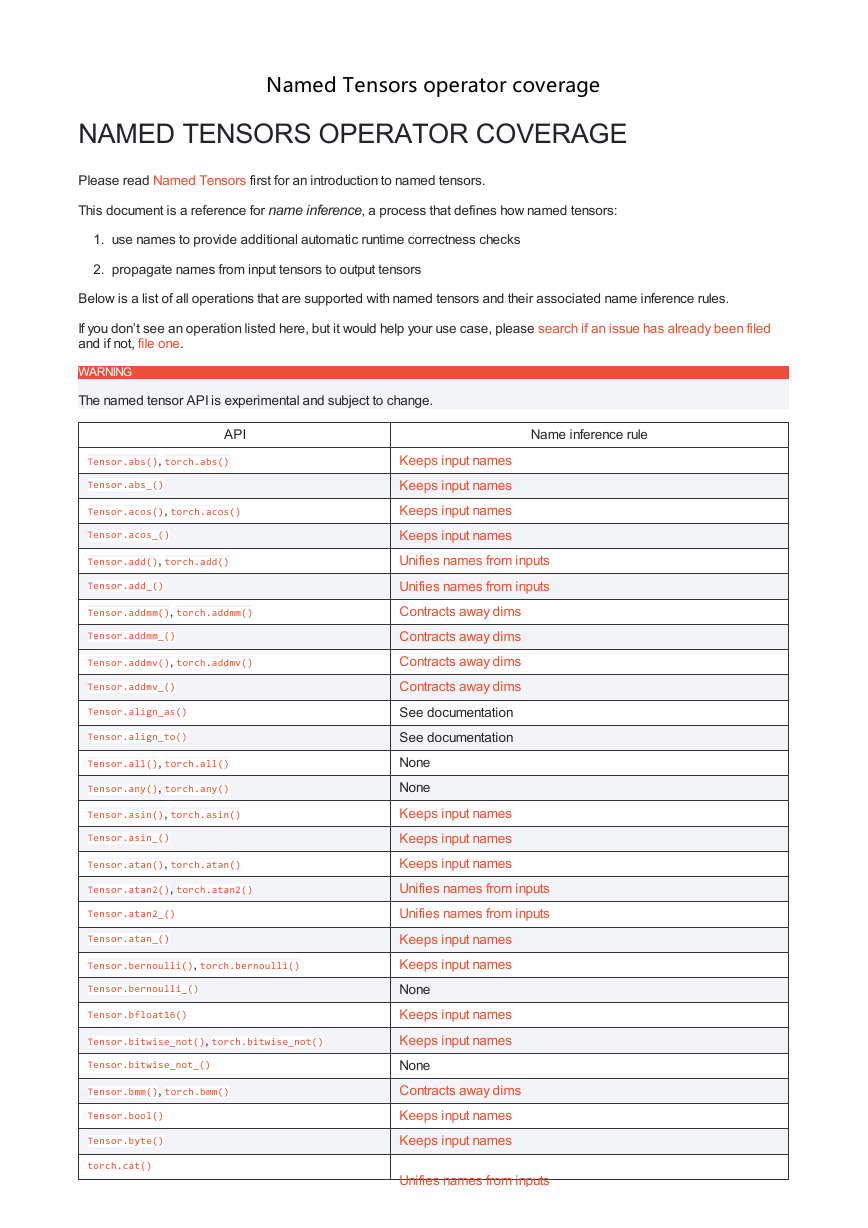
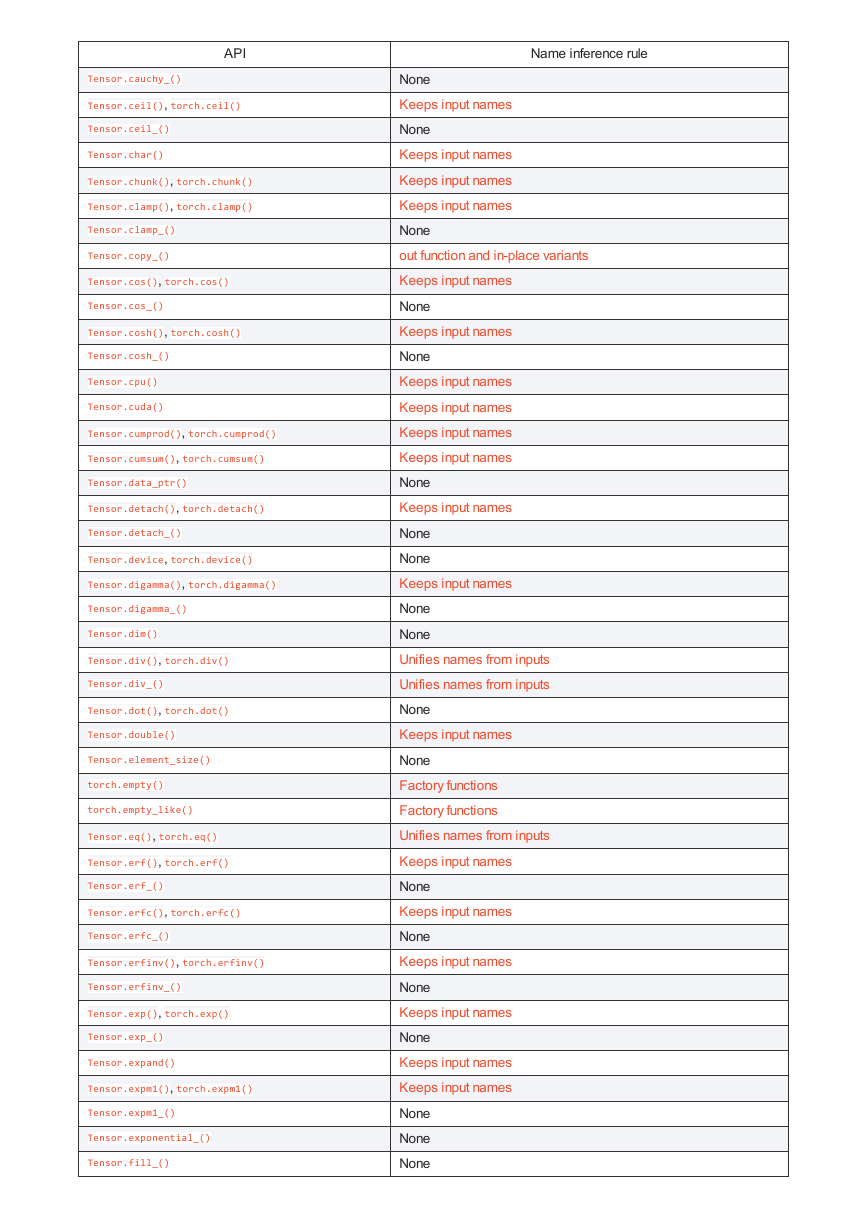
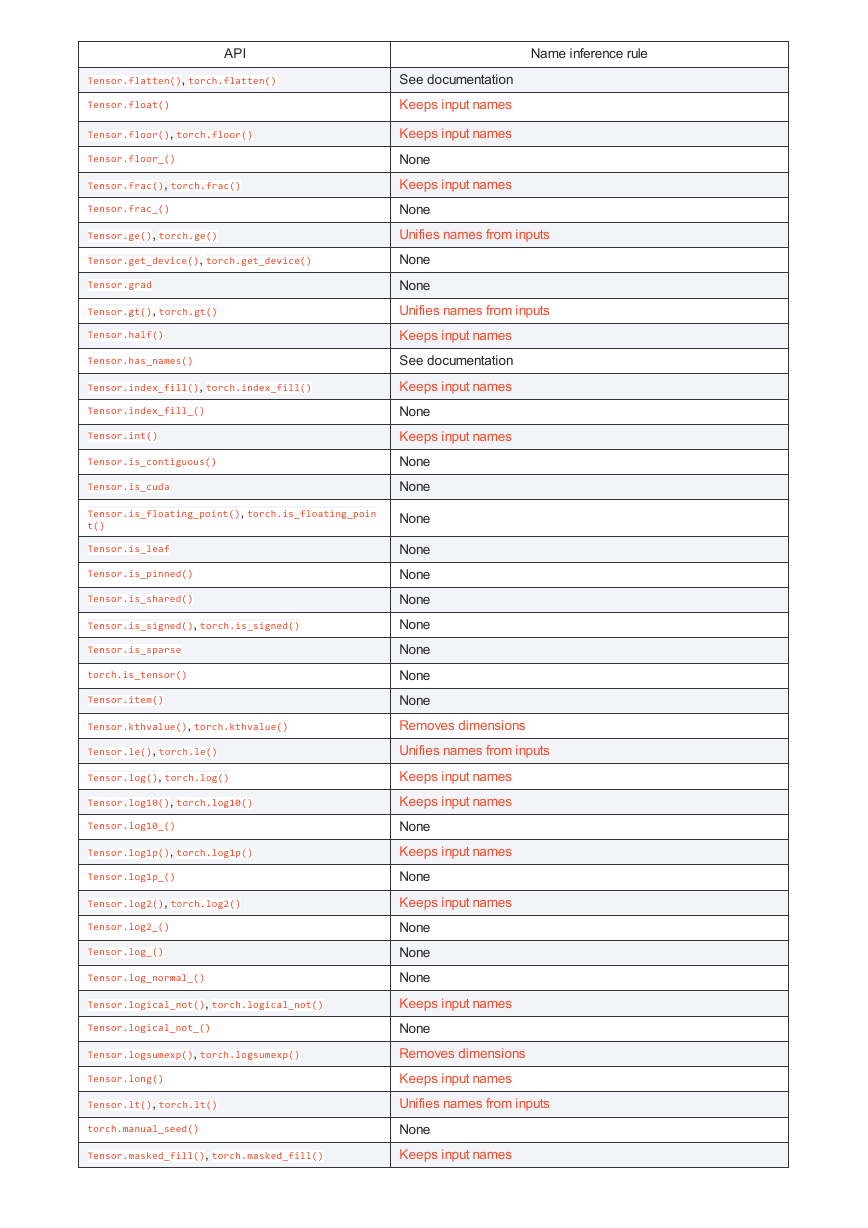
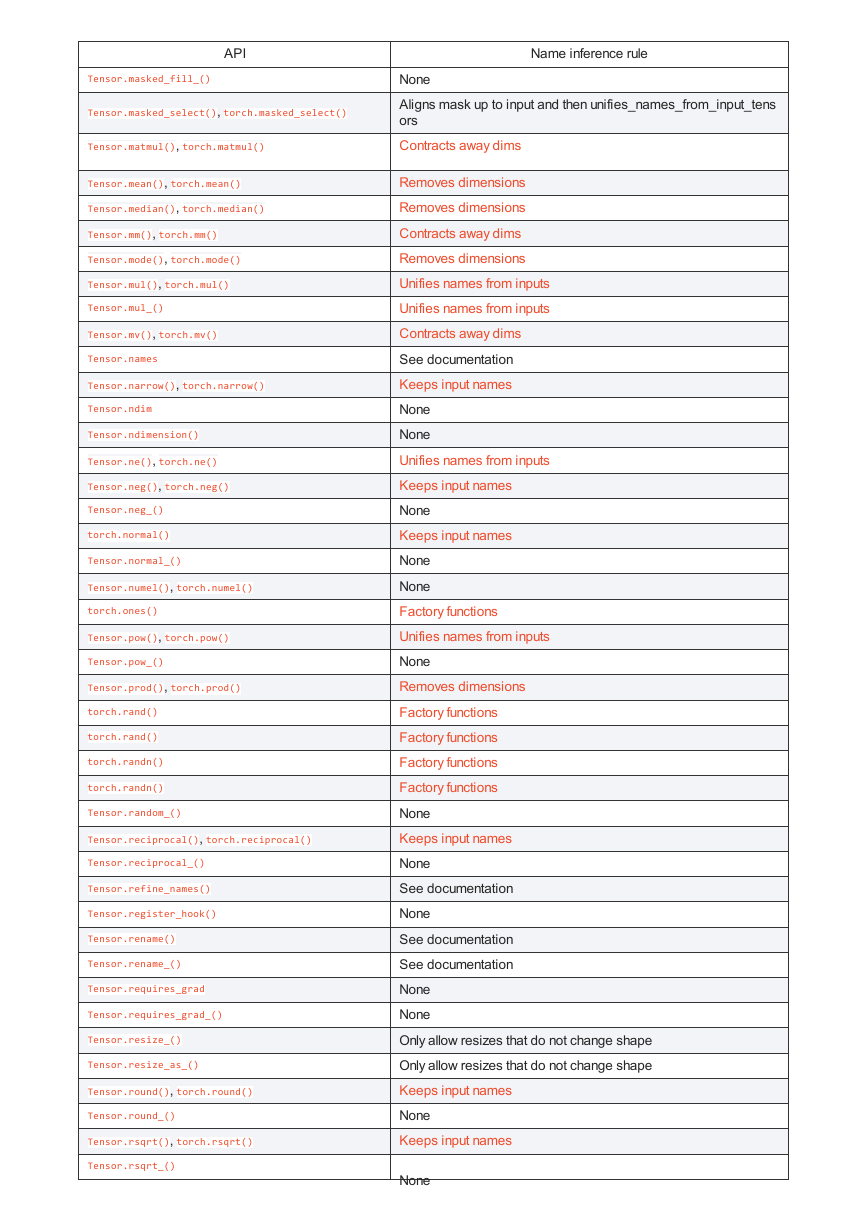
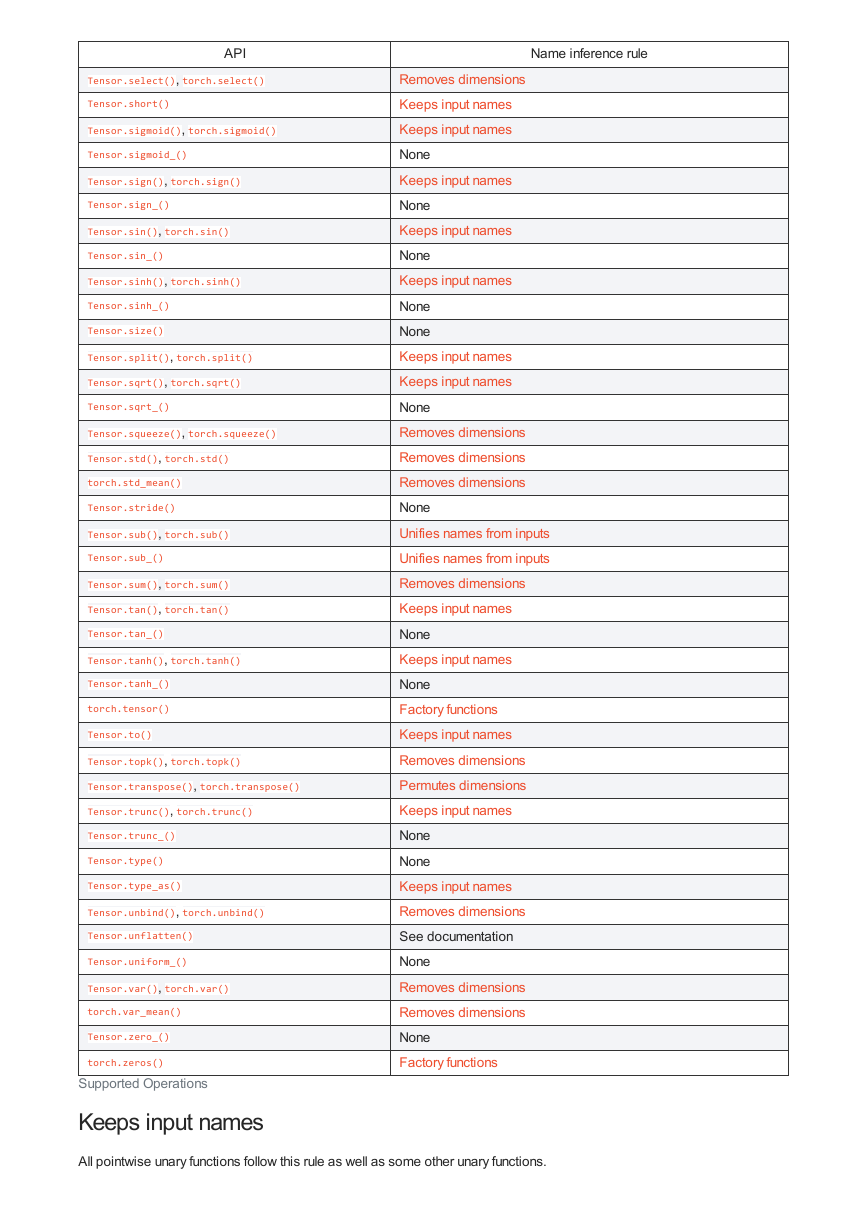
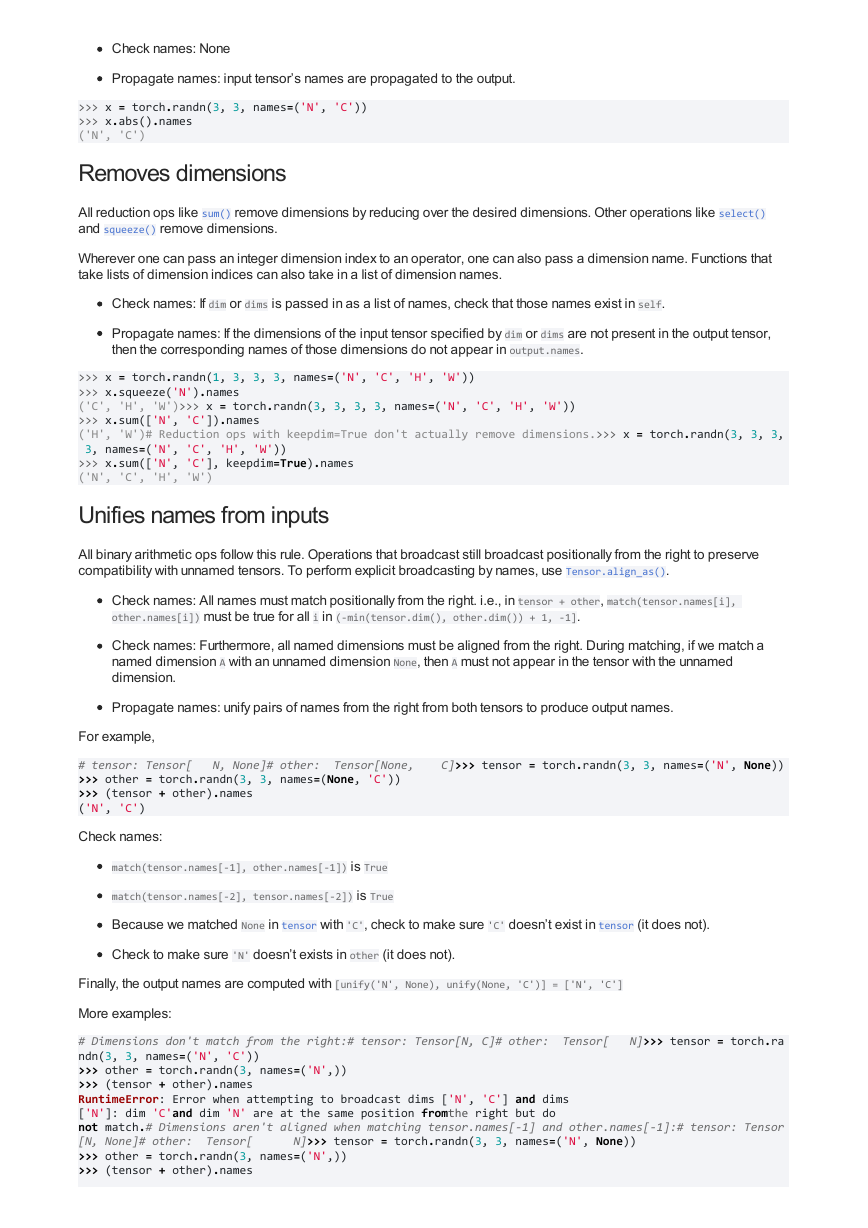
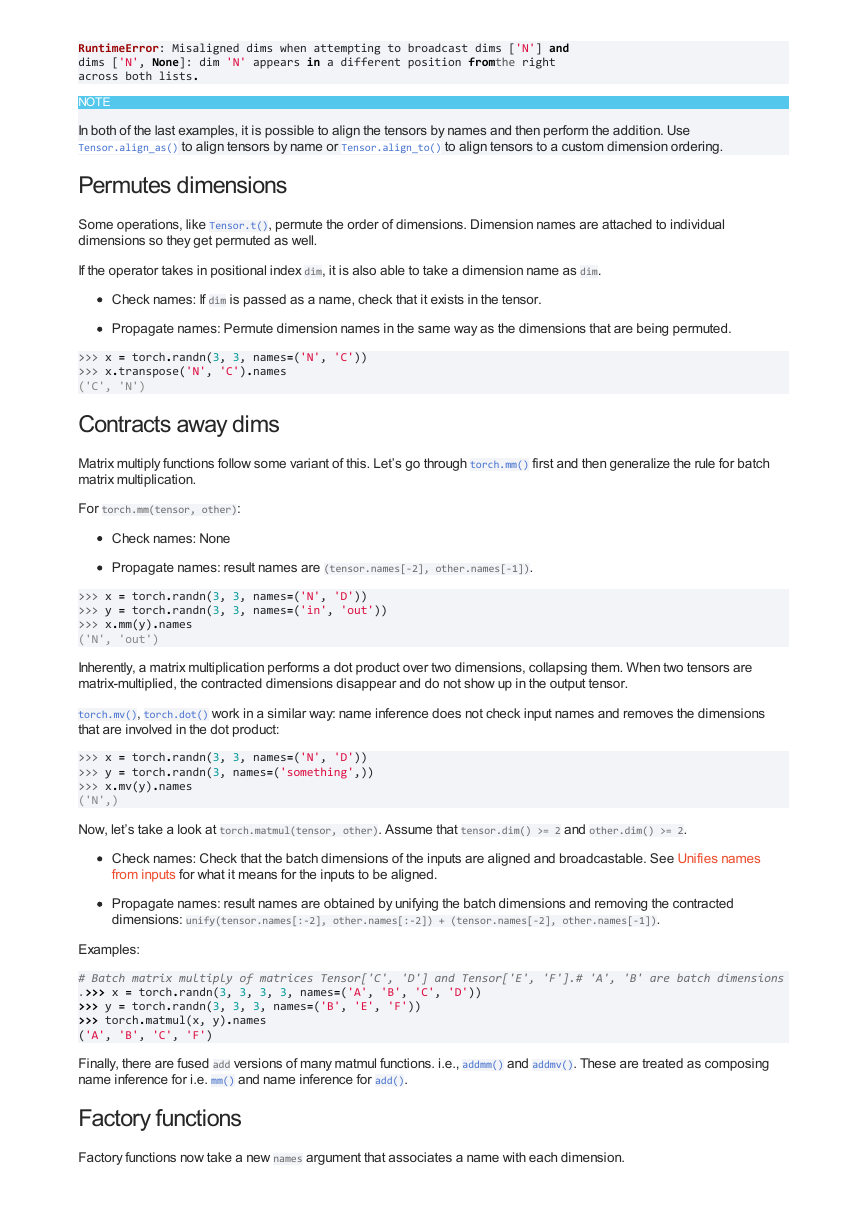








 2023年江西萍乡中考道德与法治真题及答案.doc
2023年江西萍乡中考道德与法治真题及答案.doc 2012年重庆南川中考生物真题及答案.doc
2012年重庆南川中考生物真题及答案.doc 2013年江西师范大学地理学综合及文艺理论基础考研真题.doc
2013年江西师范大学地理学综合及文艺理论基础考研真题.doc 2020年四川甘孜小升初语文真题及答案I卷.doc
2020年四川甘孜小升初语文真题及答案I卷.doc 2020年注册岩土工程师专业基础考试真题及答案.doc
2020年注册岩土工程师专业基础考试真题及答案.doc 2023-2024学年福建省厦门市九年级上学期数学月考试题及答案.doc
2023-2024学年福建省厦门市九年级上学期数学月考试题及答案.doc 2021-2022学年辽宁省沈阳市大东区九年级上学期语文期末试题及答案.doc
2021-2022学年辽宁省沈阳市大东区九年级上学期语文期末试题及答案.doc 2022-2023学年北京东城区初三第一学期物理期末试卷及答案.doc
2022-2023学年北京东城区初三第一学期物理期末试卷及答案.doc 2018上半年江西教师资格初中地理学科知识与教学能力真题及答案.doc
2018上半年江西教师资格初中地理学科知识与教学能力真题及答案.doc 2012年河北国家公务员申论考试真题及答案-省级.doc
2012年河北国家公务员申论考试真题及答案-省级.doc 2020-2021学年江苏省扬州市江都区邵樊片九年级上学期数学第一次质量检测试题及答案.doc
2020-2021学年江苏省扬州市江都区邵樊片九年级上学期数学第一次质量检测试题及答案.doc 2022下半年黑龙江教师资格证中学综合素质真题及答案.doc
2022下半年黑龙江教师资格证中学综合素质真题及答案.doc